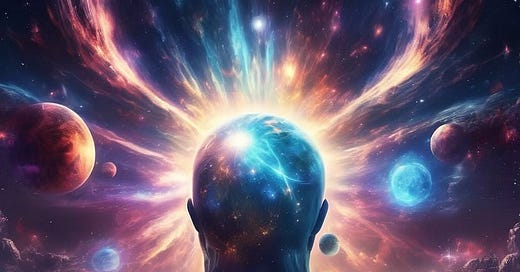What is transcendence and why does it matter?
From casual flow states to ecstatic breakthroughs, transcendence pulls at our deepest drives—craving meaning, risking excess, demanding care...
We crave transcendence. Not as a quirky spiritual side project, but as a core feature of our psychology. From ancient rituals to football matches, from psychedelic visions to washing dishes in flow, human beings are wired to reach beyond ourselves—to dissolve the ego, escape the noise, and feel part of something larger.
This desire isn’t religious, but it’s something religion has historically sought to help with. It’s not exclusive to spiritual seekers or mystics either. As Aldous Huxley put it, transcendence is a “deep-seated urge to self-transcendence”—a longing that shapes our daily behaviours, dreams, and devotions.
But if we don’t understand this urge—if we don’t guide it—it can turn toxic. It can drive destructive addictions, fanaticism, tribalism, and alienation.
My current research explores how transcendence functions in our personal lives and collective psychology. And crucially, how it can be misdirected—how losing ourselves in something larger can either bring healing or harm.
Flow, Ecstasy, and the Unselfing Mind
Let’s begin with a kestrel. Philosopher Iris Murdoch described a moment where her anxious, ego-centric thoughts were broken by the simple sight of a kestrel outside her window. In that brief encounter, she forgot herself. The bird filled her attention. The ego dissolved. This, she said, was a moment of “unselfing.”
Psychologist Mihaly Csikszentmihalyi gave a name to this state: flow. It’s when we’re so immersed in an activity—painting, gardening, singing, even driving—that time and the self slip away. We’re not overthinking. We’re just being.
As Jules Evans explains in The Art of Losing Control, these “unselfing” states are crucial. The ego is brilliant at surviving, but exhausting to inhabit. It scans for threats, fears death, clings to identity. Transcendence offers relief: a reset button for the self.
But there’s more. Flow can deepen into something stronger—ecstasy—from the Greek ekstasis, meaning “to stand outside oneself.” Whether through deep meditation, psychedelics, romantic rapture, or brushes with death, we sometimes feel pulled into a space beyond ego. We feel connected to nature, to God, to the cosmos, to humanity.
These moments can be transformative. They help us break out of ourselves and into something larger. And whether we realise it or not, many of us are chasing them all the time.
Misdirected Transcendence
But not all transcendence is healthy. There are better and worse ways to lose ourselves.
Huxley called it “downward transcendence.” We might use alcohol, drugs, or destructive behaviour to escape the self. Actor Martin Sheen described addiction as “misdirected transcendence”—a broken search for love, belonging, and meaning.
I remember a teacher once telling me how his friend drank a bottle of vodka every night. “Why?” he asked. “Because it gets you there,” the friend replied. At 17, I didn’t understand. Now I do. “There” is the unselfed state—the relief from ego. Albeit the downward relief that Huxley and others have spoken of.
And in recovery, as Sheen and Evans both note, we don’t just remove the substance. We replace it with a spiritual structure. That’s why the Serenity Prayer used in Alcoholics Anonymous and other recovery programmes is so powerful. Not because it invokes a particular God, but because it reorients the mind toward something greater—toward acceptance, courage, and wisdom. Toward surrender.
This principle applies far beyond substance addiction.
Transcendence on the Terraces
Take football. As a fan, I’ve felt transcendence more powerfully at matches than almost anywhere else. The crowd, the chanting, the unity when a goal is scored—it’s ecstatic. You hug strangers. You lose track of time. You’re part of something bigger.
But football also shows how transcendence can become misdirected. That same unity can curdle into violence, fights, hatred, and tribal rage. The desire for ecstasy turns into an us-versus-them mentality. Unity with your tribe becomes aggression toward the other.
The craving is the same: to escape ego, to feel belonging. But when it isn’t consciously directed, it can become toxic.
As I’ve grown older, I’ve learned to enjoy football differently. I immerse myself fully and completely irrationally—shouting, swearing, singing—but when it’s over, I return to myself with gratitude. I no longer need the result to validate me (although my wife will confirm I am prone to a brief sulk upon defeat).
That’s the difference between immersive joy and obsessive escape.
Beyond Rationalism
When I first came across the ancient Greek philosophy of Stoicism—partly to manage anxiety, and while writing my last book—I found it incredibly useful. I used Philosophy for Life by Jules Evans (among other texts) in therapy and teaching. But like Evans, I found Stoicism’s limits.
The Stoics, brilliant as they were, weren’t big on ecstasy. They prized self-control, reason, and detachment. For a time, that worked. But over time, I needed more: connection, ritual, mystery, art, and surrender. I needed to lose control a little—to loosen the grip of the rational mind.
That’s where The Art of Losing Control helped. Evans explains how surrender and transcendence are just as vital to human flourishing as discipline and structure. We need both.
We need a framework that helps us explore ecstasy without becoming consumed by it.
A Psychology of Transcendence
Enter Abraham Maslow. Most people know his “hierarchy of needs”—a pyramid rising from survival to self-actualisation. But as Ramona Slusarczyk pointed out to me a few years ago, fewer know that he later added a sixth and final stage: transcendence.
Maslow saw that true human flourishing went beyond personal success. We need a connection with something larger: nature, society, the cosmos, the divine. He died before fully developing this model, but psychologist Scott Barry Kaufman has taken up where he left off.
Kaufman updated Maslow’s hierarchy using modern psychology. For him, transcendence is essential, not just mystical. We don’t need to become monks or gurus (although as Father Nicholas Buxton shows, there’s plenty we can learn from monastic traditions). Transcendence can arise in everyday life: from creativity, kindness, service, and deep relationships. It’s about integrating personal growth with collective purpose.
Kaufman offers a grounded vision: transcendence through presence, through love, through contribution. He’s not dismissive of mysticism, but he doesn’t require it either.
Mysticism Without Dogma
The mystical traditions I explore in future posts—especially in the work of Father Richard Rohr—don’t demand belief in the supernatural. Rohr speaks to believers and sceptics alike. Following the way of St Francis of Assisi, his street theology is lived, embodied, and somewhat “ordinary”.
Like Kaufman, Rohr understands transcendence as a deeply human condition. His contemplative mysticism offers a way to experience presence, connection, and meaning without rigid doctrine or fantastical claims.
Rohr and Kaufman both emphasise non-duality—the practice of moving beyond binary thinking. Good/bad, believer/sceptic, mind/body. When we transcend dualism, we begin to see the deeper interconnection of all things.
This is also where James Hollis offers profound insight. A Jungian analyst, Hollis argues that embracing ambiguity is essential to spiritual and psychological maturity. As he writes:
“Doubt is unsettling to the ego, and those who are drawn to ideologies that promise the dispelling of doubt by proffering certainties will never grow. In seeking certainty, they are courting the death of the soul, whose nature is forever churning possibility, forever seeking the larger, forever riding the melting edge of certainty’s glacier.”
Certainty comforts the reactive ego. But doubt, paradox, and mystery invite transformation. In this space of not-knowing, transcendence becomes a living, evolving reality rather than a fixed belief. That’s why I started this Substack: to create a space for the not-knowing necessities of being human.
In future posts, I’ll explore stories that touch on mystical theology, UFOs, psychedelics, near-death experiences, and more. Not because I want to convince you of anything. But because these are modern expressions of the same ancient urge: the desire to know the seemingly unknowable, to connect, to seek wholeness, to transcend.
The question is: what are the stories we tell when we tell transcendental stories about arcane phenomena?
If we can approach these topics with curiosity, humility, and a grounded sense of psychological insight, we may just find that the cosmos is already whispering to us, not from some distant galaxy, but from within the sacred now.
Coming soon: Why we need mentors and wise elders, and how the mystics help us find them again.







I love James Hollis especially his book, Swamplands of the Soul: New Life in Dismissal Places. He’s been interviewed several times on Speaking of Jung. His work is such a gift to the world.
Embracing ambiguity does feel like a measure of psychological maturity. That’s what ketamine assisted psychotherapy assisted in my development. It helped me break down rigid thought patterns. Doubt is unsettling to the ego. Uncertainty it’s something that I need to sit with at times.
Is it okay not to know?
This is where the conversation around UFOs, near death experiences, the existence of God gets a little dicey. How do we even begin to approach these topics? Unless, you have a sense of certainty or confidence in what you know. There’s an inherent paradox.
I'm interested in exploring many of the topics you mentioned. I'm not sure if I align with the notion that transcendence is a psychological experience. It feels as if you're attempting shifting the definition in order to reimagine the conversation. But, maybe I perceive it that way as the transcendent, for me, has always been associated with God. I'm not a practicing religious person though I feel I have had a transcendent experience.
My experience of what I understand to be the transcendent included ego death and encountering the infinite. There was considerable psychological suffering and emotional surrender involved in the process. It’s not an experience I sought. It’s something I experienced due to life circumstances.
I'm looking forward to seeing where your Substack leads you as well as us.
Thank you. Well written. Prompted me to subscribe.
Something wonderful is going to happen.